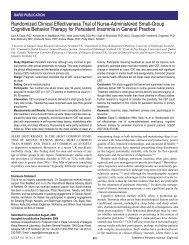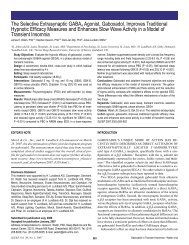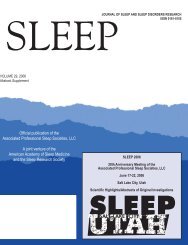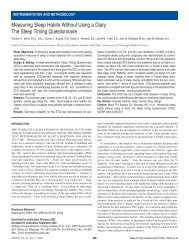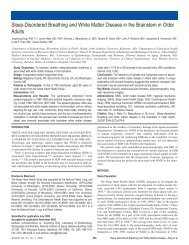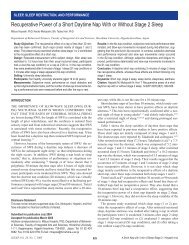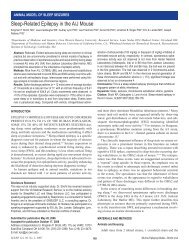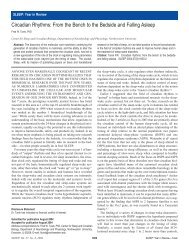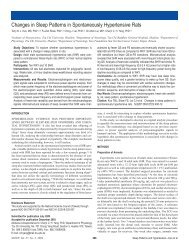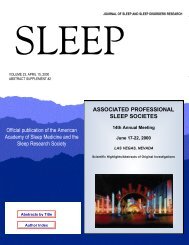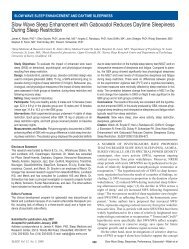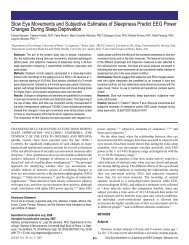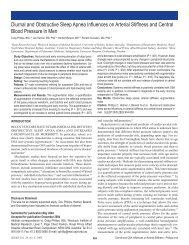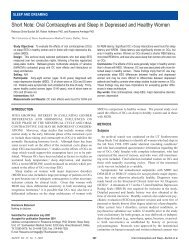SLEEP 2011 Abstract Supplement
SLEEP 2011 Abstract Supplement
SLEEP 2011 Abstract Supplement
Create successful ePaper yourself
Turn your PDF publications into a flip-book with our unique Google optimized e-Paper software.
B. Clinical Sleep Science V. Sleep Disorders – Movement Disorders<br />
0596<br />
ONSET OF ACTION OF ROTIGOTINE TRANSDERMAL<br />
SYSTEM IN THE TREATMENT OF RESTLESS LEGS<br />
SYNDROME (RLS): A POST-HOC ANALYSIS OF DATA FROM<br />
A 1-WEEK PILOT STUDY<br />
Moran K 1 , Bogan R 2 , Stiasny-Kolster K 3 , Schollmayer E 4 , Bauer L 4 ,<br />
Oertel W 3<br />
1<br />
UCB Pharma Inc, Smyrma, GA, USA, 2 SleepMed of South Carolina<br />
Inc, Columbia, SC, USA, 3 Phillips-Universität, Marburg, Germany,<br />
4<br />
Schwarz Biosciences GmbH, a member of the UCB Group of<br />
Companies, Monheim, Germany<br />
Introduction: Placebo-controlled trials have demonstrated the efficacy<br />
of rotigotine transdermal system in the treatment of moderate-to-severe<br />
idiopathic RLS; however, rotigotine onset of action has not previously<br />
been investigated. SP666 was a double-blind pilot study with rotigotine<br />
in patients with RLS. In this post-hoc analysis, onset of action was<br />
assessed using RLS symptom severity ratings following first patch application.<br />
Methods: Patients received rotigotine (0.5, 1.0 or 2.0 mg/24h) or placebo<br />
(n=17/13/19/14 respectively) for 1 week without titration, and recorded<br />
their ratings of RLS symptom severity (0=no symptoms; 10=maximum<br />
symptoms), sleep satisfaction (-3=very dissatisfied; 3=very satisfied)<br />
and daytime sleepiness/tiredness (0=none to 10=maximum) in daily<br />
diaries. The first post-treatment assessment (T1) was from diary entries<br />
completed the morning after first dose of trial medication, ie ~12 hours<br />
after first patch application.<br />
Results: Baseline to T1 improvements were observed with rotigotine<br />
versus placebo in severity of symptoms while falling asleep<br />
(mean±standard deviation [SD] change from baseline: rotigotine,<br />
-1.17±2.75, -1.15±2.72 and -1.92±3.39 points with 0.5, 1, and 2 mg/24<br />
h respectively; 0.27±1.31 points with placebo), symptom severity during<br />
the night (rotigotine, -1.37±3.83, -1.69±2.29 and -2.46±3.44 points;<br />
placebo, -0.06±1.38 points), daytime symptom severity while resting<br />
(rotigotine, -0.42±2.31, -0.36±1.52, and -1.4±2.59 points; placebo,<br />
0.04±1.30 points), sleep satisfaction (0.84±2.51, 0.91±1.86 and<br />
0.37±2.13 points; placebo, 0.28±1.03 points), and daytime sleepiness/<br />
tiredness (rotigotine, 0.71±2.09, 0.28±1.39 and 0.98±1.93 points; placebo,<br />
-0.38±1.20 points). As the first patch was applied in the evening and<br />
T1 took place the following morning, no change in daytime symptom<br />
severity can be expected.<br />
Conclusion: Rotigotine showed a descriptive benefit versus placebo in<br />
alleviating RLS symptoms at the first post-treatment timepoint assessed.<br />
In this post-hoc assessment, statistical analysis was descriptive only, due<br />
to low patient numbers; however, these results suggest an onset of action<br />
of rotigotine within 1 day, and possibly within the first 12 hours after<br />
initial patch application.<br />
Support (If Any): UCB Pharma Inc, delegated by Schwarz Pharma Ltd,<br />
Ireland<br />
0597<br />
EVALUATION OF THE ASSOCIATION BETWEEN THE<br />
INTERNATIONAL RLS STUDY GROUP RATING SCALE<br />
(IRLS) AND THE RESTLESS LEGS SYNDROME QUALITY OF<br />
LIFE QUESTIONNAIRE (RLS QOL): A POST HOC ANALYSIS<br />
OF A PHASE III ROTIGOTINE CLINICAL TRIAL<br />
Allen RP 1 , Oertel W 2 , Walters AS 3 , Schollmayer E 4 , Grieger F 4 ,<br />
Moran K 5 , Kohnen R 6,7<br />
1<br />
Johns Hopkins University, Baltimore, MD, USA, 2 Philipps-<br />
Universität, Marburg, Germany, 3 Dept of Neurology, Vanderbilt<br />
University School of Medicine, Nashville, TN, USA, 4 Schwarz<br />
Biosciences GmbH, a member of the UCB Group of Companies,<br />
Monheim, Germany, 5 UCB Pharma Inc, Smyrna, GA, USA,<br />
6<br />
University of Erlangen-Nuremberg, Nuremberg, Germany, 7 Research<br />
Pharmaceutical Services Inc, Fort Washington, PA, USA<br />
Introduction: The IRLS and RLS QoL are both validated, disease-specific<br />
instruments for assessing disease severity and quality of life, respectively,<br />
in patients with restless legs syndrome (RLS). To understand<br />
how IRLS scores relate to meaningful benefits from the patient perspective,<br />
we carried out a scale association analysis between the IRLS and<br />
the 12-item RLS QoL (developed by R Kohnen).<br />
Methods: In a Phase III, double-blind trial (SP790 [NCT00136045]),<br />
patients with moderate-to-severe idiopathic RLS (IRLS ≥15) were randomized<br />
to rotigotine transdermal system (1-3 mg/24h titrated to fixed<br />
dose over 3 weeks, maintained at that dose for 6 months) or placebo.<br />
Rotigotine-treated patients achieved significantly greater improvements<br />
in IRLS score from baseline to end of maintenance (EoM), and quality<br />
of life (as measured by mean changes in RLS QoL total score) improved<br />
in a dose-dependent manner. Scale associations were analysed categorically<br />
for IRLS and RLS QoL total scores, and as continuous variables,<br />
using the safety set of rotigotine- and placebo-treated patients combined<br />
(n=458).<br />
Results: At baseline and EoM, categorical analysis showed a trend towards<br />
higher RLS QoL scores (ie, worsening quality of life) with increasing<br />
disease severity category on the IRLS. Mean baseline RLS QoL<br />
scores were 19.71, 29.14 and 40.81 in IRLS categories 11-20, 21-30 and<br />
31-40, respectively. Mean EoM RLS QoL scores were 7.66, 19.21, 29.91<br />
and 43.92 in IRLS categories 0-10, 11-20, 21-30 and 31-40, respectively.<br />
Pearson correlation coefficients at baseline (0.69; p



